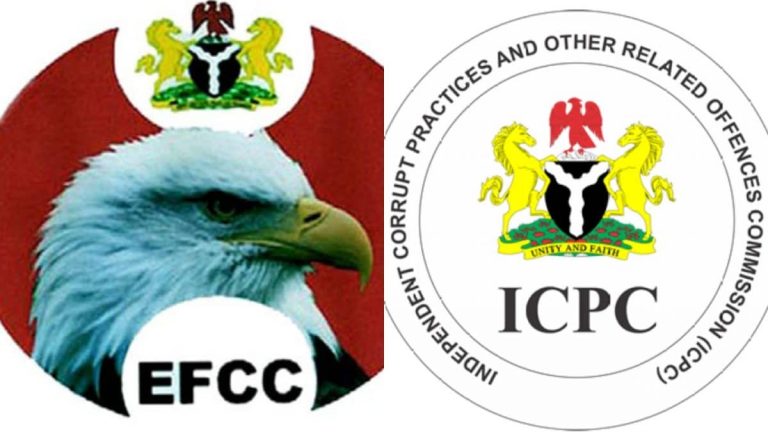From Fred Ezeh, Abuja
Nigeria’s anti-graft agencies, Economic and Financial Crimes Commission (EFCC) and the Independent Corrupt Practices Commission (ICPC) have cautioned civil servants against circumventing procurement processes to enrich themselves.
They dropped the warning at a two-day integrity innovation lab for public servants to support the development of culture of integrity within the government organized by Accountability Lab Nigeria, in Abuja, on Monday.
The agencies referred them to several sections of their establishment Acts, and the punitive measures recommended for anyone found to have erred and corruptly enriched his or herself in the cause of procurement processes.
EFCC Chairman who was represented by Dr. Johnson Eze, highlighted several efforts being used by the Commission to tackle different windows of financial corruption in Nigeria, stressing that while a particular window is detected and closed, other ones are created by the criminals especially through the digital space to further perpetrate their corrupt practices.
He appreciated the Accountability Lab, Nigeria, for the opportunity to strengthen discussion and conversations on ways to serve Nigerians better, rebuild public confidence and trust in the ability of government to serve them better.
He assured Nigerians that EFCC is always available for partnerships with individuals, groups and corporate organizations, that would enhance the fight against corruption in Nigeria.
He further neutralized the believe that EFCC is playing double standard in the fight against corruption, reminding Nigerians about the presumption of innocent law, and the fact that Nigeria is a country that is guided by law.
On his part, the ICPC Chairman who was represented by Clifford Oparaodu, said the ICPC has been deeply involved in the monitoring of procurement processes in public service arena, challenging the civil servants to always abide by the established rules so there can be clean financial management.
Director General, Bureau of Public Service Reforms (BPSR) who was represented by Head of Audit, Emmanuel Achoda, in his remarks, stressed the need to address perceived gaps in service delivery challenges in the Nigeria public sector which, according to him, have been criticized for lack of citizens’ trust, low accountability, and poor oversight by regulatory institutions.
He said: “Globally, public service delivery has remained a great challenge, as there is perceived dissatisfaction by citizens on service delivery leading to public mistrust and lack of confidence in the integrity of public officers.
“It’s pertinent to state that for any public institution to attain a world class standard comparable to any of the developed countries, it must have reliable public officers, to drive the objectives and goals of government.
“Upholding integrity in the public service is apt and very strategic to good governance, this accounts for why countries with high level of moral integrity will exhibit lower levels of corruption.”
The Country Director, Accountability Lab, Nigeria, Friday Odeh, in his remarks, explained that the workshop was organized essentially to close or attempt to close the huge trust and confidence gap between the public servants and Nigerians.
“This is important at this time that we are having conversations on bad governance. There was protests across the country recently which provided opportunity for citizens to demand for a better governance and leadership system that will better their lives.
“There’s need for public servants to build trust with the citizens. Public service should be built on integrity, trust and efficiency. We should be accountable and transparent in our dealings with Nigerians. Quality services is far fetched and that need to be corrected.”
He further explained that the workshop was an opportunity for representative from all sectors including education, health, economy, and others, to extensively discuss the best way to serve Nigerians better.
“People should not put their personal interest above the interest of the public. Additionally,
Government should proactively disclose information and dealings that will make Nigerians believe and trust them.
“We obviously have challenges with services delivery in Nigeria. Another objective of workshop was to make the public servants understand that they are there to serve the interest of the people first and not theirs.”
